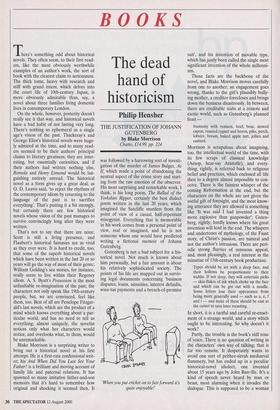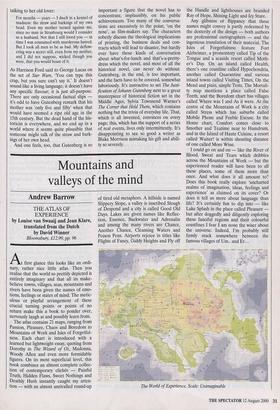BOOKS
The dead hand of historicism
Philip Hensher
THE JUSTIFICATION OF JOHANN GUTENBERG by Blake Morrison Chatto, £14.99, pp. 224 here's something odd about historical novels. They often seem, to their first read- ers, like the most obviously worthwhile examples of an author's work, the sort of book with the clearest claim to seriousness. The thick tome, heavy with research and stiff with grand intent, which delves into the court life of 10th-century Japan, is more obviously admirable than, say, a novel about three families living domestic lives in contemporary London.
On the whole, however, posterity doesn't really see it that way, and historical novels have a bad habit of not lasting very long. There's nothing so ephemeral as a single age's vision of the past. Thackeray's and George Eliot's historical novels were huge- ly admired at the time, and to many read- ers seemed to be their authors' principal claims to literary greatness; they are inter- esting, but essentially curiosities, and if their authors had written nothing else, Romala and Henry Esmond would be lan- guishing entirely unread. The historical novel as a form gives up a great deal; as Q. D. Leavis said, 'to reject the rhythms of the contemporary idiom by returning to the language of the past is to sacrifice everything'. That's putting it a bit strongly, but certainly there are few historical novels whose vision of the past manages to survive convincingly long after they were written.
That's not to say that there are none; Scott is still a living presence, and Flaubert's historical fantasies are as vivid as they ever were. It is hard to credit, too, that some of the superb historical novels which have been written in the last 20 or so years will go the way of most of their genre; William Golding's sea stories, for instance, really seem to live within their Regency idiom. A. S. Byatt's Possession is the most unfaultable re-imagination of the past; the characters not only speak like 19th-century people, but, we are convinced, feel like them, too. Best of all are Penelope Fitzger- ald's last novels, which are the product of a mind which knows everything about a par- ticular world, and has no need to tell us everything; almost uniquely, the novelist notices only what her characters would notice, and overlooks what, to them, would be unremarkable.
Blake Morrison is a surprising writer to bring out a historical novel at his first attempt. He is a first-rate confessional writ- er; his And When Did You Last See Your Father? is a brilliant and moving account of family life and paternal relations. It has spawned so many imitative father-and-son memoirs that it's hard to remember how original and shocking it seemed then. It was followed by a harrowing sort of investi- gation of the murder of James Bulger, As If, which made a point of abandoning the neutral aspect of the crime story and start- ing from the raw emotion of the observer. His most surprising and remarkable work, I think, is his long poem, The Ballad of the Yorkshire Ripper, certainly the best dialect poem written in the last 20 years, which imagined the Sutcliffe murders from the point of view of a casual, half-repentant misogynist. Everything that is memorable in his work comes from a personal point of view, real or imagined, and he is not someone whom one would have predicted writing a fictional memoir of Johann Gutenberg.
Gutenberg is not a bad subject for a his- torical novel. Not much is known about him personally, but a fair amount is about his relatively sophisticated society. The points of his life are mapped out in surviv- ing legal documents concerning 'business disputes, loans, annuities, interest defaults, wine-tax payments and a breach-of-promise 'When you put cricket on to fast forward it's quite enjoyable!' suit', and his invention of movable type, which has justly been called the single most significant invention of the whole millenni- um.
Those facts are the backbone of the novel, and Blake Morrison moves carefully from one to another; an engagement goes wrong, thanks to the girl's plausibly bully- ing mother, a creditor forecloses and brings down the business disastrously. In between, there are creditable stabs at a remote and exotic world, such as Gutenberg's planned feast —
frumenty with venison, beef, boar, stewed capon, roasted cygnet and heron, pike, perch, lobster, bream, baked apple tart, jellies and custard.
Morrison is scrupulous about imagining, too, the intellectual world of the time, with its few scraps of classical knowledge (Aesop, hear-say Aristotle), and every- thing, rightly, is referred back to religious belief and practices, which enclosed all life then to a degree almost impossible to con- ceive. There is the faintest whisper of the coming Reformation at the end, but the characters on the whole are not given the useful gift of foresight, and the most know- ing utterance they are allowed is something like 'It was said I had invented a thing more explosive than gunpowder'; Guten- berg, rightly, hardly knows where his great invention will lead in the end. The whispers and, under tones of mythology, of the Faust story, of Christ's passion, are natural and not the author's intrusions. There are peri- odic strong flurries of sensuous appeal, and, most pleasingly, a real interest in the minutiae of 15th-century book production:
Types should be set with a deep face, and their hollows be proportionate to their widths. If not deep, they will entertain picks — skin-flakes of ink which choke up the face and which can be got out with a needle. Some letters lose their appearance from being more generally used — such as a, e, f and t — and more of these should be cast at the outset to save later recasting.
In short, it is a tactful and careful re-enact- ment of a strange world, and a story which ought to be interesting. So why, doesn't it work?
Partly, the trouble is the book's stiff tone of voice. There is no question of writing in the characters' own way of talking; that is far too remote. It desperately wants to avoid one sort of prithee-sirrah mediaeval flummery, but has ended up in a peculiar historical-novel idiolect, one invented about 15 years ago by John Banville. It's a kind of speech never heard by man or beast, most alarming when it invades the dialogue. This is supposed to be a woman talking to her old lover: For months — years — I dwelt in a kennel of madness: the straw and barkings of my own head. Even my mother turned against me, since no man in Strasbourg would I consider as a husband. Not that I still loved you — in time I was consumed with murderous hatred. But I took all men to be as bad. My deflow- ering was a secret still, even from my mother, and I did not suppose, wicked though you were, that you would boast of it.
As Harrison Ford said to George Lucas on the set of Star Wars, 'You can type this crap, but you sure can't say it.' It doesn't sound like a living language; it doesn't have any specific flavour; it is just all-purpose. There are only occasional factual slips — it's odd to have Gutenberg remark that his mother was 'only five and fifty' when that would have seemed a ripe old age in the 15th century. But the dead hand of the his- toricist is everywhere, and we end up in a world where it seems quite plausible that someone might talk of the straw and bark- ings of her own head.
And one feels, too, that Gutenberg is so important a figure that the novel has to concentrate, implausibly, on his public achievements, Too many of the conversa- tions are excessively to the point, 'on the nose', as film-makers say. The characters soberly discuss the theological implications of printing, the business deals and con- tracts which will lead to disaster, but hardly ever have those kinds of conversation about what's-for-lunch and that's-a-pretty- dress which the novel, and most of all the historical novel, can never do without. Gutenberg, in the end, is too important, and the facts have to be covered, somewhat laboriously. It's instructive to set The Justi- fication of Johann Gutenberg next to a great masterpiece of historical fiction set in the Middle Ages, Sylvia Townsend Warner's The Corner that Held Them, which contains nothing but the trivia of everyday life. That, which is all invented, convinces on every page; this, which has the support of a series of real events, lives only intermittently. It's disappointing to see so good a writer as Blake Morrison mistaking his gift and abili- ty so severely.



























































 Previous page
Previous page